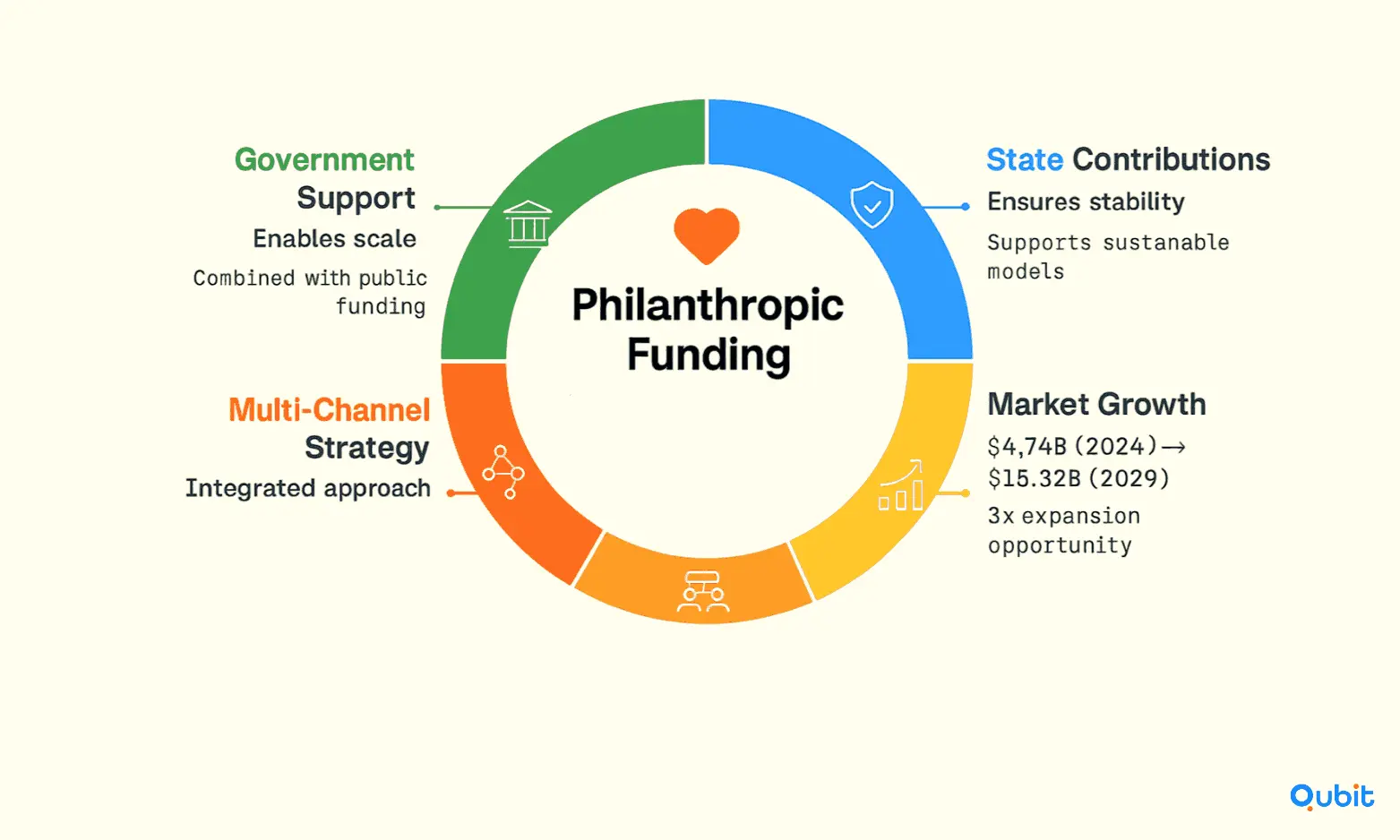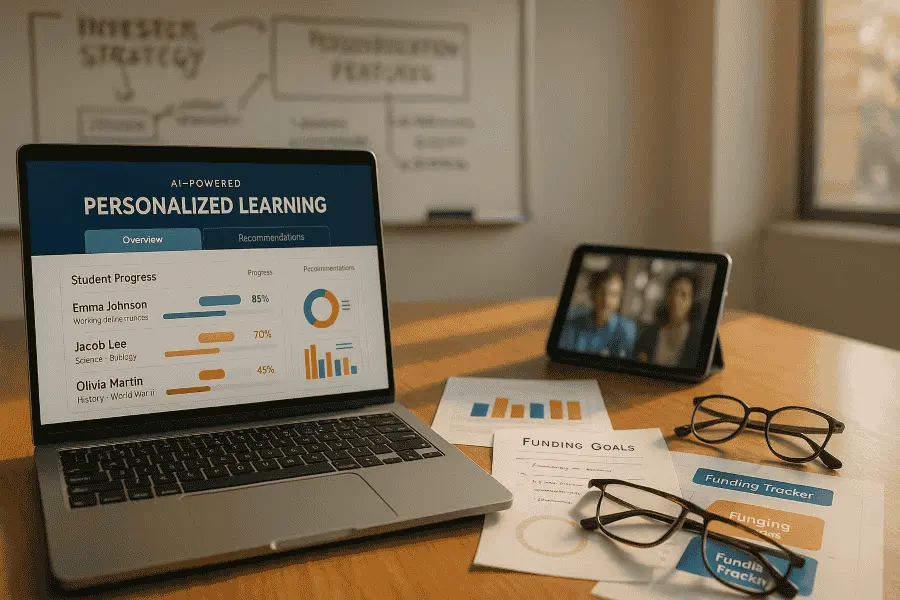Personalized learning technology is reshaping the education sector, attracting significant attention from investors. With EdTech VC funding projected at $3.5 billion in 2023, the demand for innovative, outcome-driven solutions continues to grow. Platforms that tailor learning experiences to individual needs are not only transforming education but also fueling investment opportunities.
The global AI in personalized learning market, valued at USD 6.5 billion in 2024, underscores the rapid expansion of this niche. Investors are increasingly drawn to technologies that promise measurable results and scalable impact. Insights from how to raise funds for edtech startups provide a comprehensive view of the broader investment landscape supporting personalized learning technology.
This blog explores how personalized learning technology drives EdTech funding, offering actionable strategies and data-driven insights. Let’s dive in.
Strategic Funding Structures Empowering Personalized Learning
Personalized learning has emerged as a transformative force in education, driven by funding structures that prioritize innovation and sustainability. This section explores diverse approaches to financing personalized learning, including state initiatives, multi-level government contributions, and philanthropic funding. By examining statistical trends, case studies, and actionable strategies, stakeholders can better understand how to optimize funding models for long-term success.
The Role of State Empowerment in Funding Personalized Learning
State-level initiatives play a pivotal role in shaping personalized learning programs. By structuring funding mechanisms that align with educational goals, states can empower schools to adopt adaptive learning technologies and AI-driven models. For example, the Personalized Learning Funding Structures PDF provides a detailed framework for building robust funding models tailored to local needs.
Multi-Level Government Contributions
Federal, state, and local governments collectively contribute to the success of personalized learning initiatives. The Miami-Dade Digital Learning Initiative exemplifies how coordinated funding can deliver measurable ROI. This program leveraged federal, state, and local resources to implement digital learning tools, resulting in significant statistical gains in student performance.
Innovative Funding Strategies
Creative approaches to funding are essential for sustaining personalized learning. Industry trends, such as AI-driven hyper-personalization, attract top funding sources by demonstrating the potential for scalable impact. Additionally, targeted investments in adaptive learning platforms, as illustrated by the Adaptive Learning Implementation case study, show how strategic funding can drive measurable outcomes. Illustrate the impact of targeted investments to emphasize the importance of aligning financial support with educational goals.
The Growing Role of Philanthropic Contributions

Philanthropic funding for personalized learning has become increasingly significant as private donors recognize the transformative potential of education technology. By combining philanthropic contributions with government support, schools can create sustainable funding structures that ensure long-term success. The Personalized learning market to grow from $4.74B (2024) to $15.32B (2029) highlights the expanding opportunities for investment in this sector.
To optimize funding structures for personalized learning, stakeholders must adopt a multi-channel approach that combines state support, government contributions, and philanthropic funding. By integrating innovative strategies and learning from successful case studies, such as the Miami-Dade initiative, educators and policymakers can build sustainable models that drive measurable outcomes. For additional insights into specialized funding approaches, explore funding models personalized learning edtech to understand how tailored strategies can align with broader educational goals.
Expanding Horizons: Related Educational Resources
Personalized learning is reshaping the educational landscape, and the right resources can serve as catalysts for this transformation. By combining innovative policy frameworks, competency-based approaches, and state-level strategies, educators and policymakers can create dynamic learning environments tailored to individual needs. This section highlights key resources that provide actionable insights and tools to support the implementation of personalized learning.
Innovative Policy Solutions for Education
Policy innovation is a cornerstone of educational transformation. Forward-thinking policies not only address current challenges but also anticipate future needs. For those seeking inspiration, Embracing Policy Innovation offers a bold vision of future-focused education. This resource explores how innovative policies can drive systemic change, ensuring that education systems remain adaptable and inclusive.
By examining such frameworks, educators and policymakers can identify strategies to integrate personalized learning into broader educational reforms. These policies often emphasize flexibility, inclusivity, and the use of technology to enhance learning outcomes.
Competency-Based Education: A State-Level Perspective
Competency-based education (CBE) is gaining traction as an effective approach to personalized learning. Unlike traditional models, CBE focuses on mastery of skills rather than seat time, allowing students to progress at their own pace. To explore how states are adopting this approach, The State of Competency-Based Education Policy provides an interactive map detailing relevant state policies.
This resource is invaluable for understanding how different regions are implementing CBE frameworks. It highlights best practices, identifies gaps, and offers a comparative view of state-level initiatives. Such insights can inspire educators to adapt these strategies to their local contexts, ensuring that every student has the opportunity to thrive.
State Frameworks for Personalized Learning
State-level frameworks play a pivotal role in accelerating the adoption of personalized learning. These frameworks often serve as blueprints, guiding schools and districts in implementing innovative practices. The State Policy Framework for Personalized Learning is a comprehensive resource that showcases how policy can drive educational innovation.
This framework emphasizes the importance of aligning policies with the unique needs of students and communities. It also highlights the role of technology in creating scalable and sustainable personalized learning models. By exploring this resource, educators can gain practical insights into designing policies that prioritize student-centered learning.
Integrating Policy and Technology
The intersection of policy and technology offers immense potential for advancing personalized learning. By aligning innovative policies with technological tools, schools can create more effective and equitable learning environments. For instance, interactive maps and framework documents not only provide guidance but also help stakeholders visualize the impact of their initiatives.
Moreover, integrating policy insights with technological innovations can significantly enhance funding strategies. Policymakers can use data-driven approaches to allocate resources more effectively, ensuring that every student benefits from personalized learning opportunities.
Conclusion
Securing sustainable funding for personalized learning technology requires a blend of innovative strategies, multi-level funding approaches, and robust policy frameworks. By focusing on these elements, EdTech initiatives can create impactful, scalable solutions that address diverse educational needs. Additionally, data-driven insights and actionable strategies play a pivotal role in ensuring that these efforts lead to meaningful and lasting transformations in education.
If you're ready to secure the necessary funding, our Fundraising Assistance team is here to help. Let's collaborate to drive your personalized learning initiatives forward.
Key Takeaways:
- Personalized learning technology is a catalyst for diverse EdTech funding streams.
- Robust funding structures, spanning state, federal, local, and philanthropic sources—are essential for sustainable educational transformation.
- Innovative funding strategies and case studies demonstrate the ROI of adaptive learning technologies.
- Policy frameworks and curated resources provide actionable insights for enhancing personalized learning.
- Leveraging our expert services at Qubit Capital can empower stakeholders to secure and optimize funding.
Frequently asked Questions
What is personalized learning in education?
Personalized learning refers to an educational approach that adapts teaching methods and materials to meet the unique needs of each student. By utilizing technology and data, it creates tailored learning experiences that boost engagement and improve academic outcomes.


 Back
Back



